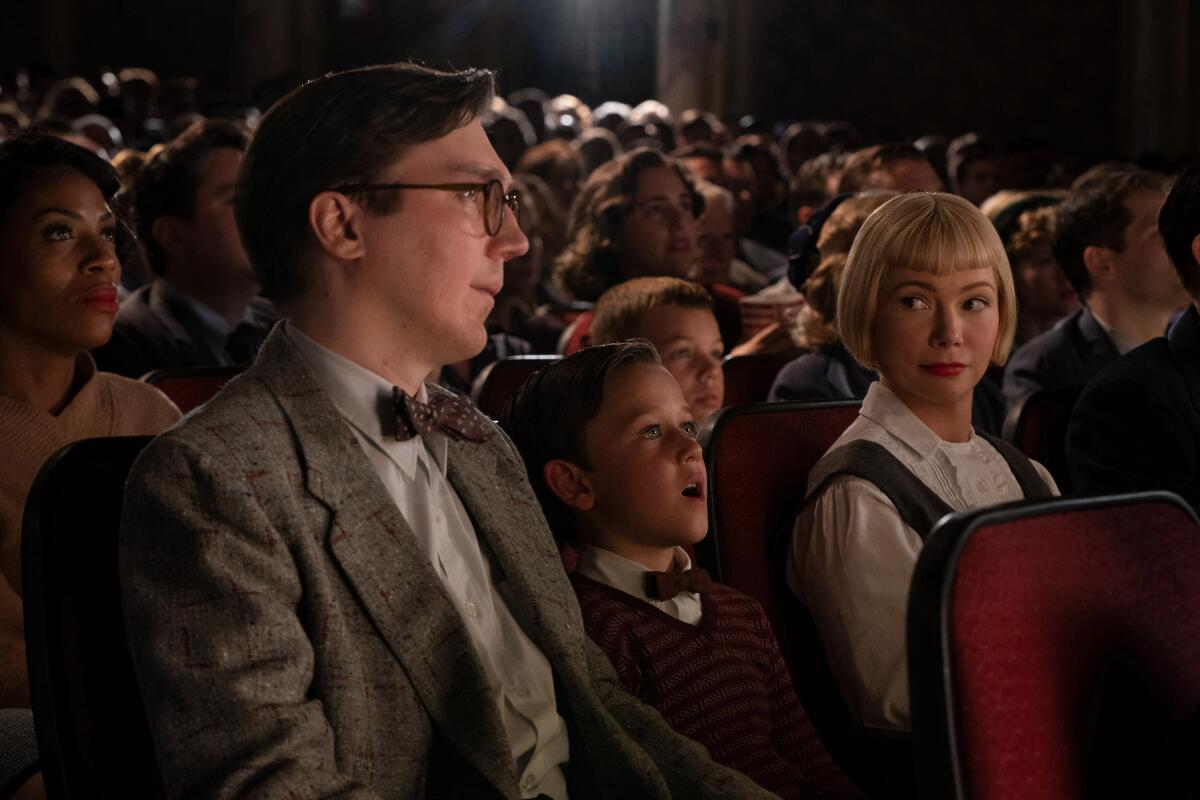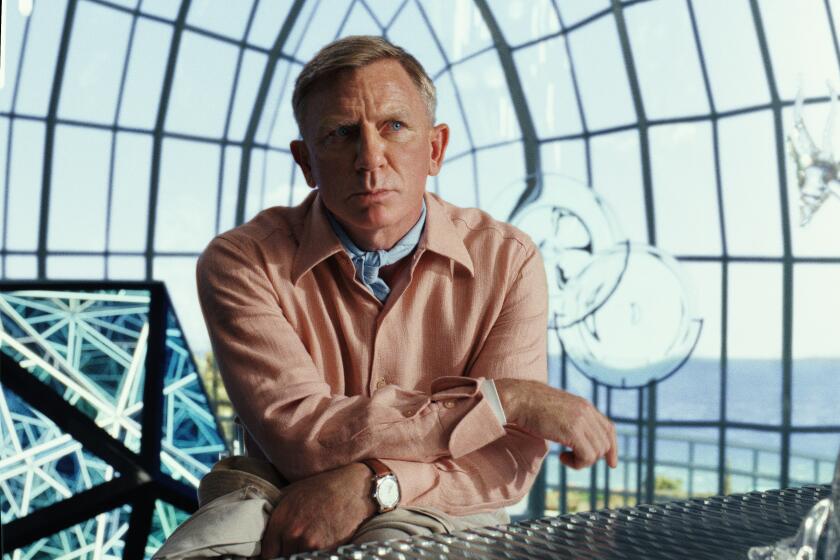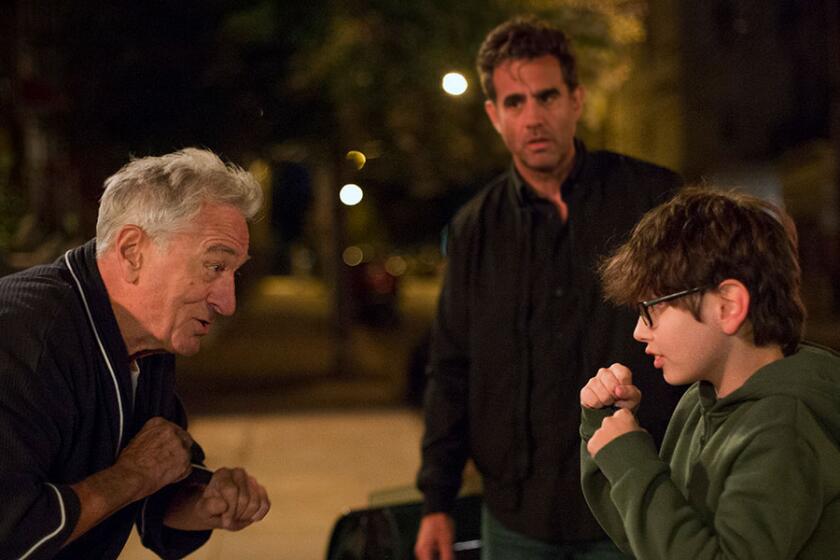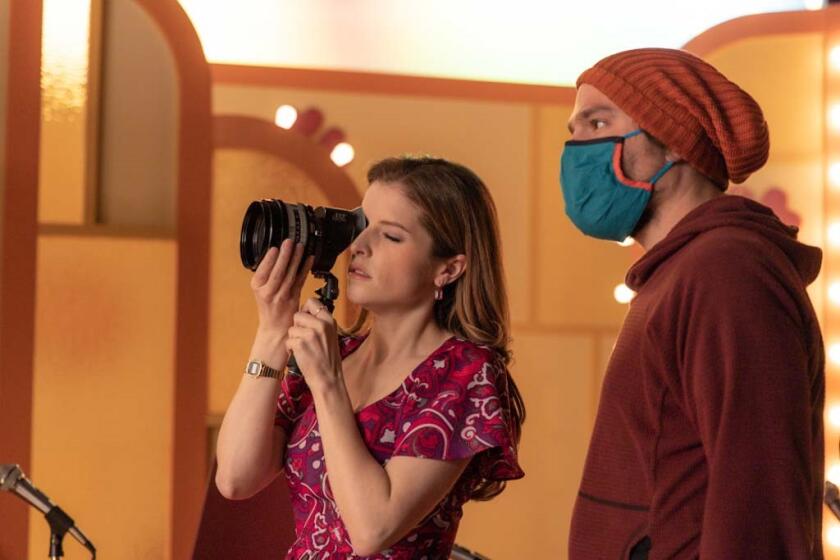Toronto Film Festival launches two must see movies in ‘The Fabelmans’ and ‘Glass Onion’

Moments after the final scene of “The Fabelmans,” Steven Spielberg’s exquisitely funny and melancholy memory piece, unspooled here in Toronto on Saturday night, I scribbled two words in my notebook: “magic trick.” As with a lot of great movie endings, that scene is what a lot of viewers filing out of the theater will be eager to discuss first.
I won’t spoil anything here (the official release is still two months away), but let’s just say that ending is a shimmering blend of personal and cinematic history, features a gem of a surprise performance and closes with a visual flourish — a literal parting shot — that turns imperfection into utter perfection. Spielberg, who’s been criticized over the years for his supposedly weak kickers, sticks the landing here with a wit and grace that might leave you wondering, “How’d he do that?,” even as it becomes clear he couldn’t have done it any other way.
That ending was one of a few enchantments in store for audiences fortunate enough to find themselves at the Toronto International Film Festival on Saturday night. This 10-day event reliably squeezes its biggest premieres into its opening weekend, ensuring sold-out shows and maximum media exposure; even still, it was a bold move to program the world premiere of “The Fabelmans” less than an hour after that of another dazzling feat of cinematic prestidigitation: “Glass Onion: A Knives Out Mystery,” Rian Johnson’s splendidly entertaining follow-up to his 2019 Toronto-premiered murder mystery, “Knives Out.”
From the moment they were announced, these were the festival’s two hottest tickets, and unveiling them back-to-back felt like both a boast and a promise: After a few years of COVID-19 pandemic disruption, Toronto was back in full force, baby, and so perhaps were the movies themselves and their power to captivate hundreds — nay, thousands — of strangers clustered together in the dark.
“The Fabelmans,” a lovingly fictionalized re-creation of a life lived in thrall to the power of cinema, makes that theme explicit from the start. On a cold 1952 night in New Jersey, a young boy named Sammy Fabelman (Mateo Zoryon Francis-DeFord) goes to the movies with his family and finds his life forever changed. His eyes are opened, improbably, by Cecil B. DeMille’s “The Greatest Show on Earth,” typically remembered as one of the worst films to win the Oscar for best picture, but hey, the movie gods work in mysterious ways.
That’s a lesson Sammy will learn again and again as the years pass, bringing forth changes both mundane and momentous, including his steady transformation from a passionate young movie lover into an emergent master filmmaker. (He’s played in his teenage years, and for most of the movie’s 2½-hour running time, by Gabriel LaBelle.)
Billed as Steven Spielberg’s most personal film, the semiautobiographical drama ‘The Fabelmans’ received its world premiere at the Toronto Film Festival. The Q&A afterward answers your burning questions.
Sammy is accompanied on this journey by the other members of his close-knit Jewish family: his younger sisters, who delight in acting in his early home movies, and his parents, who are variably supportive of his obsession. His father, Burt (Paul Dano), a computer developer on the rise, is patient and kind, if also too much of a pragmatist and workaholic to fully appreciate Sammy’s gifts. His mother, Mitzi (Michelle Williams), is emotionally generous and tempestuous by nature, with a passionate artistic sensibility — she’s a gifted pianist — that reflects Sammy’s own.
More than once we see Mitzi huddling in the dark to watch one of her son’s short films, and each time what she sees takes her by surprise, not always pleasantly so. In “The Fabelmans,” the flickering light of a projector beam can fabricate beautiful lies and bring ugly truths to the surface, sometimes in the same instance.
And what is the precise ratio of lies to truths in this captivating, shrewdly calculated trip down memory lane? Only Spielberg truly knows. (His returning screenwriter, Tony Kushner, may also have an inkling.) The question hangs over everything Sammy experiences: the upheaval of multiple family relocations from New Jersey to Arizona to California, a tough-love lesson (delivered by a marvelous Judd Hirsch) on what it means to give your life to art, a fateful camping trip with a family friend (Seth Rogen), devastating losses and acts of betrayal, vicious antisemitic attacks at school, the stirrings of young love. But to get hung up on exactly what did and didn’t happen seems especially limiting in a movie that, like most magic tricks, relies on a sly weave of substance and illusion.
Set to be released Nov. 11 by Universal Pictures, “The Fabelmans” is already being hailed by many, maybe a bit presumptuously, as Spielberg’s most personal film — his “Fanny and Alexander,” his “Amarcord.” But it might be more precisely understood as a uniquely confessional work, in which a great artist freely and happily acknowledges the manipulation inherent in the art form he was born to master.
By the end, young Sammy has made action, horror, westerns and war pictures; he’s also learned to use the medium to conceal and distort truth, to bend reality to his narrative will. Exerting control over his art — and as Spielberg’s partisans and detractors know, few filmmakers control their material so rigorously — becomes a means of dulling, displacing and sometimes sanitizing his own acutely felt pain.
It’s Sammy’s mother, Mitzi, who realizes this insight when she first sees her son at work. And Williams’ vibrant, slow-to-shatter performance is its own superb (and again, supremely calculated) rejoinder to the charge that Spielberg’s filmography is relatively lacking in significant female characters — a charge that he acknowledges here in one amusing self-dig of a scene.
And so “The Fabelmans” becomes a gradually developing road map to Spielberg’s career, in which some of his most cherished career motifs snap carefully into place. He shows us, not for the first or hopefully last time, that suburban life can be a bustling comedy and an aching tragedy rolled into one, and that there are few images more transporting than that of a face lighting up in the darkness, whether from the presence of an otherworldly visitor or the glow of a cinema screen. He also reminds us, with a glee that anticipates the joys of everything from “Duel” to “Raiders of the Lost Ark” and beyond, that there are few things more satisfying than seeing a bully get his comeuppance.

Speaking of bullies and comeuppances: The first “Knives Out” was both a densely plotted whodunit and the story of a monstrously wealthy family’s well-earned downfall. “Glass Onion” continues to give America’s entitled scumbags their due, though this time the focus isn’t on a family but rather an inner circle of self-styled disruptors.
Their ranks include a trailblazing scientist (Leslie Odom Jr.), a crafty politician (Kathryn Hahn), a tech-bro mastermind (Edward Norton), an eminently cancellable fashion icon (Kate Hudson), a men’s rights advocate (Dave Bautista) and a disgruntled associate (Janelle Monáe) who was recently cast out of the group.
In tried-and-true whodunit fashion, these friends and frenemies convene on a remote location — in this case, a luxurious compound on a private Greek isle — for a weekend of isolation and intrigue. The pandemic is in full swing, one of several nods to current events in a comedy whose jabs are always fastidiously up-to-the-minute. But even as the characters’ COVID-19 masks come off, any number of disguises and false fronts remain carefully in place, to be detected — and ingeniously exposed — by Daniel Craig’s bumbling-yet-brilliant sleuth, Benoit Blanc, who by some mysterious circumstance finds himself a guest at this invitation-only gathering.
Even more than in “Knives Out,” Craig devours the role of this Southern-gentleman sleuth with relish (plus maybe a few other lip-smackable condiments); liberated from the exertions of James Bond, he seems to be having the time of his life. There’s a particular pleasure in seeing the actor who famously donned tight La Perla swimming trunks in “Casino Royale” show up poolside in a vintage blue-striped cabana set. I don’t think that counts as a spoiler, though with the infernally knotty “Glass Onion” — a title that refers to a Beatles song, yes, but also a very large, very literal architectural construct — you can never be too sure. Before Saturday’s screening, publicists and festival organizers warned those in attendance not to spoil key plot details, though as ever, exactly what those details might be is open to interpretation.
But I’ll play along for now, especially since the sheer dexterity of Johnson’s plotting is impressive enough to warrant the secrecy. You need not worry about stumbling on the identities of the murderer or the victim(s?) here, or the nature of this killer’s particular modus operandi. It’s worth noting that the complexity here is in some ways more structural than situational, by which I mean that Johnson — who noted in his post-screening Q&A that every great movie whodunit must work as a movie first and foremost — has constructed this story with a virtuosity that reveals itself cinematically. A dramatic mid-movie reversal splits the narrative wide open, not unlike the teasingly elaborate puzzle boxes that figure into the plot early on.
The world premiere of Netflix’s much-anticipated sequel from writer-director Rian Johnson revealed a few mysteries while leaving plenty to still puzzle over.
For all its moment-to-moment virtuosity and sustained comic delirium, “Glass Onion” can feel a little less airtight and a little more seat-of-its-pants than its predecessor, and maybe a touch derivative in the way it repeats certain character dynamics. On the plus side, the characters here feel more vividly inhabited and more specifically drawn than their earlier counterparts. The politics are subtler and sharper; the scrumptious eat-the-rich buffet of “Knives Out” has given way to a pointed sendup of the contemporary billionaire class and the hacks and cronies who cling to it like barnacles.
And the irony of the movie’s anti-disruptor skewering is surely not lost on Johnson, since “Glass Onion” is being released by Netflix, which has long seen itself as the designated upender of the movie business. (The movie begins streaming on the platform Dec. 23 following a yet to be announced theatrical release date, and a third installment is due in 2024.)
The first “Knives Out” grossed more than $300 million worldwide, a rare and deservedly robust total for an original property. It’s doubtful that “Glass Onion” will come anywhere near that total with its theatrical rollout less of a priority this time around, which is a bummer, since a movie this good deserves the beauty of a big screen and the energy of a packed house.
It’s one more reason I was grateful to be in Toronto on Saturday night to catch this oddly complementary double bill, this inadvertent snapshot of a medium in flux. If “The Fabelmans” casts an elegiac glance backward at the classic picture shows of a great filmmaker’s youth, “Glass Onion” offers a sly reminder that the medium is still rife with future possibilities, provided that the megalomaniacs in charge don’t snuff them out. Call them two different tricks from two magicians who don’t want cinema to disappear.
World premieres of films with Harry Styles, Viola Davis, Jennifer Lawrence and more top our picks for the 2022 Toronto International Film Festival.
More to Read
Only good movies
Get the Indie Focus newsletter, Mark Olsen's weekly guide to the world of cinema.
You may occasionally receive promotional content from the Los Angeles Times.










